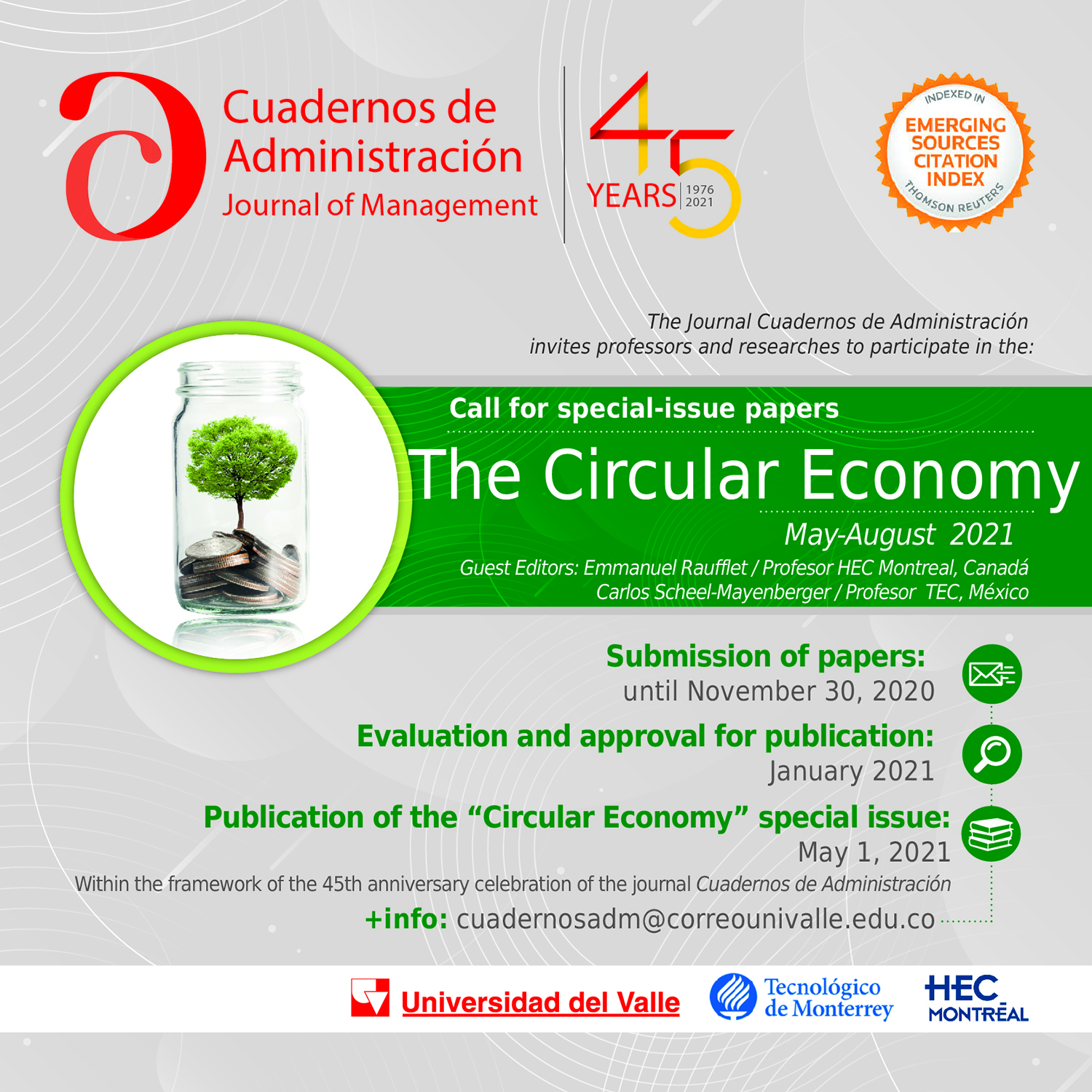Special issue on Circular Economy
Vol. 37 No. 70 (2021)
Guest Editors:
Emmanuel Raufflet, HEC Montréal, Québec, Canada
Carlos Scheel Mayenberger, Tecnológico de Monterrey, EGADE Business School, México
The circular economy (CE) has gained traction over the past decade among business organization professionals, policymakers, municipal and regional decision-makers, and researchers across disciplines related to sustainability.
CE is an umbrella concept, which refers and aims to connect diverse strategies for the generation of sustainable wealth, including (1) production-related approaches such as eco-design, responsible production, and responsible procurement, as well as (2) product optimization approaches and services such as the collaborative economy, maintenance, and repair strategies, donation and resale, the performance economy (functionality), reuse and redistribution, restoration, biochemical extraction, recycling and composting, and energy recovery.
From a theoretical point of view, the circular economy framework is the subject of much recent academic literature (Kirchherr et al., 2017). Several literature reviews have highlighted a wide variety of definitions (Homrich et al., 2017) and the controversial nature of the concept (Korhonen et al., 2018).
From a practical point of view, the circular economy challenges business and management as it proposes to shift from a linear economic model to a circular system, and to connect organizations across sectors along value chains and material flows. The circular economy is applied to their strategies on territories, both in domestic and global value chains.
This special issue of the journal Cuadernos de Administración aims to contribute to this debate. Several non-exhaustive topics are proposed:
As for circular economy and organizations: What are the dfferences and similarities between sustainability-related and circular economy, as well as between sustainable and circular strategies/models/operations?
What is the added value (or not) of the circular economy as a perspective compared to sustainable development? Why what is viewed as circular is not systematically sustainable and otherwise?
CE drivers and processes: What are the most critical drivers for transforming a linear organization into a circular system? What kind of drivers do organizations have to promote the circular economy? What is the scope of circular economy initiatives in organizations?
What processes enable the shift from CE principles to circular value cluster systems? What obstacles and facilitators appear in the implementation of circular industrial processes?
Industrial Ecology and Circular Economy: What is the role of “Industrial Ecology” in the fundamentals of CE? How do these two practices connect?
Business Models: How to transform conventional linear business models into circular business models? What are the structures of “Extended Circular Value Systems”?
Measuring: What metrics have organizations developed to assess circularity? What are experiences and effects effects of circularity in cities?
Circular Economy and Value Creation: To what extent do CE (ReSOLVE) principles contribute to transforming linear chains into circular systems?
What are the effects of circular economic models in relation to economic, social, and environmental values? What are extended value circular systems, and what sets them apart from CE practices (ReSOLVE)?
To what extent do circular economic models match or not with social inclusion or participation models? What can be learnt from such examples and experiences?How is the social factor included in CE practices?
Circular Economy and Region: What are the fundamentals, conditions, and capacities needed to implement the circular economy in a region?
What could models from organization theory contribute to shedding light on the implementation of the circular economy?
How to decouple a city's or region's economic growth from environmental damage to the territory? How to decouple economic growth from the social gap (creation of socio-economic inequalities)?
This thematic issue will accept different contributions, including research results, experiences, case studies, and notes based on research on organizations, industries and cities implementing a circular economy.
Each author may make their submission in any language. Once accepted, the author undertakes to translate it into English. It is preferable to submit your paper directly in English.
Schedule:
- Deadline for submission of papers: November 30, 2020
- Evaluation: by the end of March 2021
- Date of publication: May 1, 2021
Authors' Guidelines: https://cuadernosdeadministracion.univalle.edu.co/index.php/cuadernos_d e_administration/information/authors
Published: 2021-08-10

